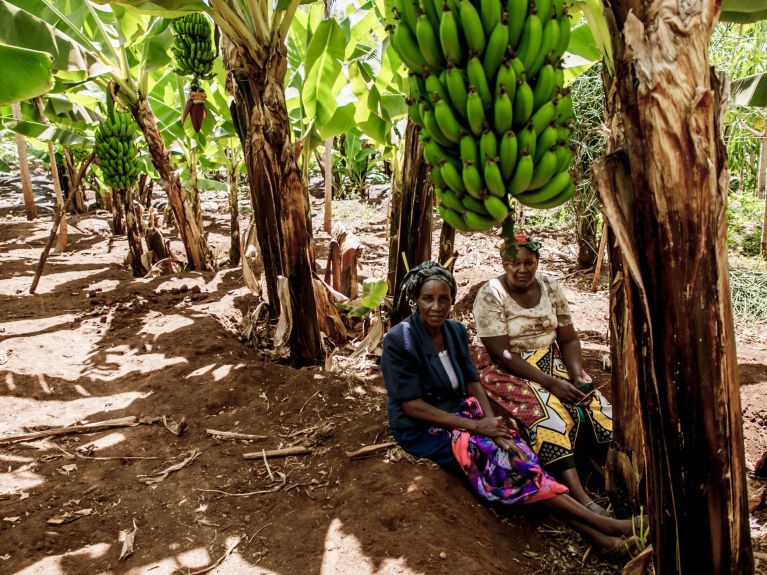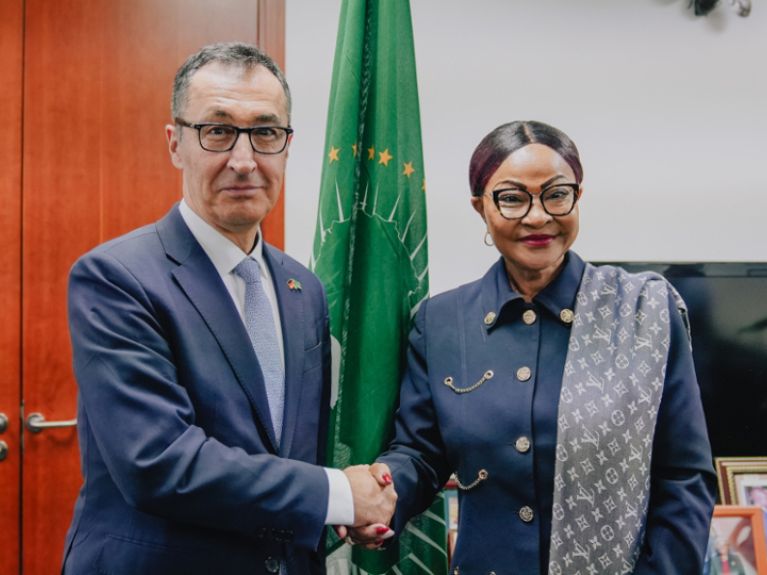Joint solutions for sustainable agriculture
In opening the Agricultural Policy Dialogue in Addis Ababa, Germany is supporting African countries in their efforts to develop sustainable agriculture.

This is an important project that will place Germany’s cooperation with its African partners on a new footing and aims to increase food security: during a four-day trip to Africa, German Food and Agriculture Minister Cem Özdemir has opened the project office of the Agricultural Policy Dialogue (APD) together with Josefa Sacko, the commissioner for agriculture of the African Union (AU). The APD, which was opened on Monday in the Ethiopian capital Addis Ababa, is the first collaborative project of its kind between the AU with its 55 member states and a German ministry.
“Strong and reliable partnerships that do not create new dependencies are more important than ever,” Özdemir said at the opening. He added that solutions to global challenges such as the battle against hunger and the climate crisis, which are key drivers of migration, could only be found by working together. “We must make sure that people have long-term prospects in their own countries - and agriculture has a central role to play in this. As I see it, this is an integral part of our agricultural diplomacy,” said Özdemir.
Sharing knowledge from Germany
To strengthen the partnership, a German-African team has been set up, and for the first time an agricultural attaché has been sent to the German Embassy in Addis Ababa, where the AU is based. “We will share longstanding experience and valuable knowledge from Germany to enable the member states of the African Union to expand their agricultural activities in a way that is sustainable and meets their specific needs,” stressed Özdemir. Furthermore, the APD will focus especially on empowering women and involving young people. The German government’s goal is to conclude more future partnerships such as the one with the AU in order to foster productive, sustainable and locally adapted agriculture.
Before his trip, Özdemir had highlighted the global challenges, which have been exacerbated by the climate crisis, hunger and conflicts. “Since these challenges affect us jointly, we can only overcome them by standing shoulder to shoulder,” the minister said. He added that sustainable agricultural policy had a central role to play. Not only was it crucial in terms of feeding people, it also created economic prospects and fostered peace, while at the same time considering the need to protect natural resources.

Helping young people, empowering women
Africa’s many young people in particular can play a part in developing innovative solutions. On Monday, Özdemir opened the African Youth Agribusiness Forum in Addis Ababa, which aims to give young people in the agriculture and food sectors a platform for exchange. Another highlight of his trip to Ethiopia will be the opening of the World Without Hunger Conference on 5 November that he will be hosting together with Gerd Müller, director general of the United Nations Industrial Development Organization (UNIDO).
On Wednesday Özdemir will be travelling on to Zambia, where he will be visiting the School of Agricultural Sciences at the University of Zambia. He will talk to students there about scientific methods of increasing climate resilience in agriculture. He will also launch a joint project of the German ministry and the Food and Agriculture Organization of the United Nations (FAO) aimed at combating food losses and food waste.
On the last day of his trip, the minister will visit the German-Zambian Agricultural Training and Knowledge Centre, which for more than ten years has been training people in climate-resilient and agroecological farming methods. In the light of the current drought in Zambia, more drought-tolerant plants are being trialled there. The minister’s trip will also include political talks with the Zambian President Hakainde Hichilema and Agriculture Minister Reuben Mtolo Phiri. A discussion with civil society representatives and farmers is also planned.


